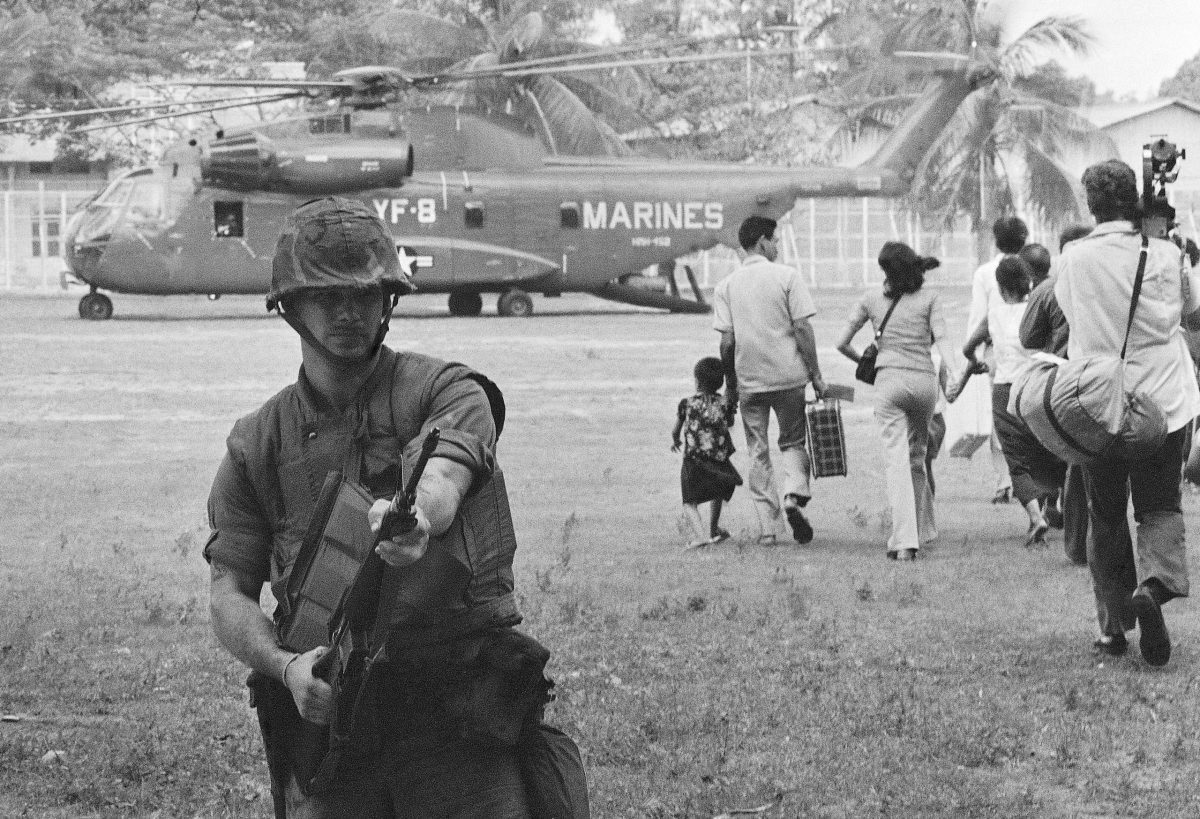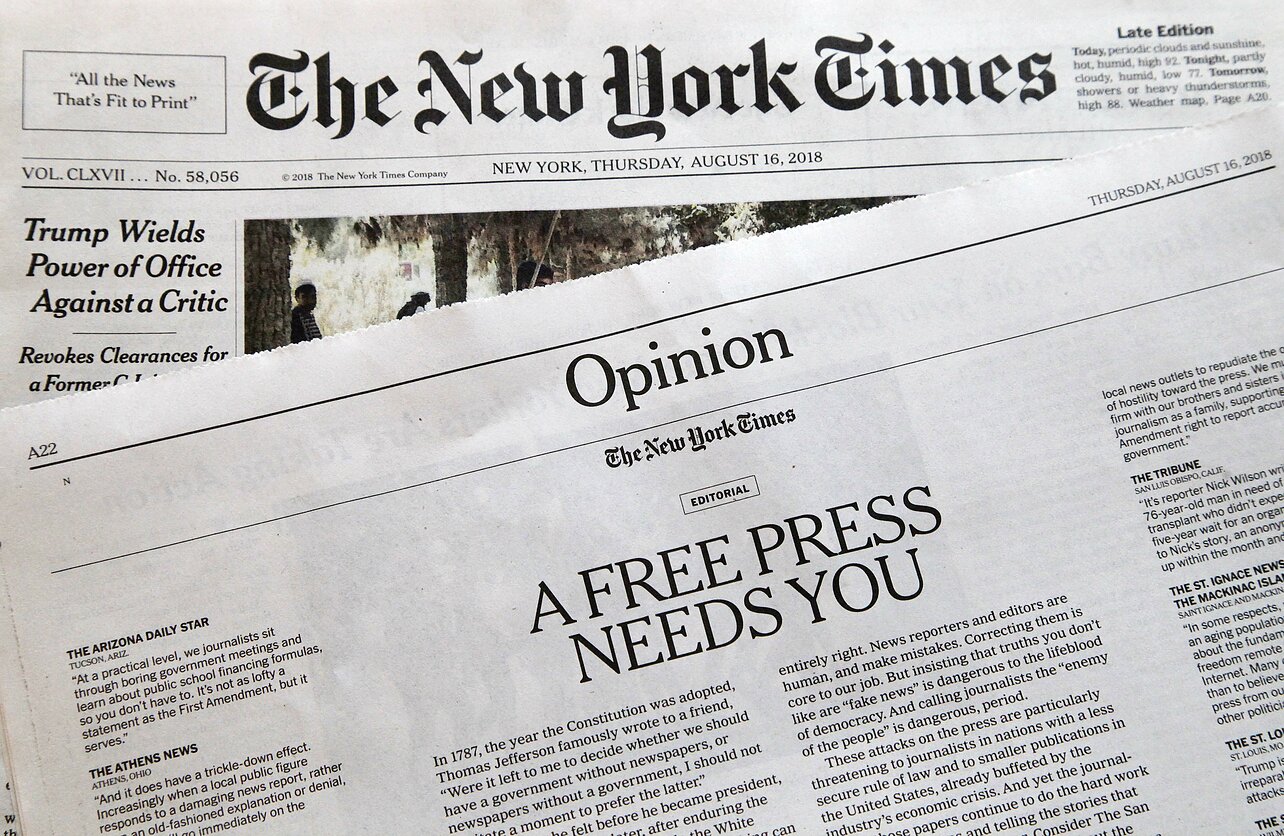THE WEEK IN REVIEW
Communist Rule Is at Least Uncertain; Napalm Is Not
by Sydney H. Schanberg
Sydney H. Schanberg, a New York Times correspondent who has been reporting on the war in Cambodia, chose to stay in Phnom Penh when other Americans were evacuated.
PHNOM PENH—The spectacle of the Americans being evacuated from Cambodia—with helicopters dropping from the skies and stony-faced Marines armed to the teeth protecting the Embassy evacuees from nothing, with curious crowds of Cambodians watching another American spectacle they did not understand and with Embassy homes being ransacked by military police immediately after the officials’ departure—is perhaps a fair epitaph for American policy in Indochina, or at least in Cambodia.
After five years of helping a feudal government it scorned and fighting a war it knew was hopeless, the United States has nothing to show for it except a sad evacuation in which the Ambassador carried out the American flag in one hand and his Samsonite suitcase in the other.
There are, however, a million Cambodians killed or wounded (one seventh of the population), hundreds of thousands of refugees living in shanties, a devastated countryside, children dying of starvation and carpenters turning out a steady stream of coffins made from ammunition crates.
It’s hard to declare that the Americans had good intentions in Cambodia—though some individual Americans did— because from the beginning, by Washington’s own admission, its policy had nothing to do with Cambodians. It had to do with trying to distract and deflect the North Vietnamese long enough to remove American troops from Vietnam. And after that was done, in 1973, the Phnom Penh Government became an albatross that Washington did not know how to dispose of. So yesterday the Americans went home.
Many people have asked, over the long years of the Indochina war, what the consequences of American withdrawal from this peninsula will be.
Secretary of Defense Schlesinger has said flatly—and Secretary of State Kissinger obliquely—that Indochina is of no significant strategic or political importance to American interests. Us only importance, they have said, is in whether the rest of the world will interpret an American withdrawal from the region as a failure of Washington’s credibility in failing to honor commitments.
But these concepts mean nothing to the ordinary people of Indochina and it is difficult to imagine how their lives could be anything but better with the Americans gone. For the American presence meant war to them, not paternal colonialism. The Americans brought them planes and Napalm and B-52 raids, not schools and roads and medical programs.
This is not to say that the Communist-backed governments which will replace the American clients can be expected to be benevolent. Already in Cambodia, there is evidence in the areas held by the Communist-led Cambodian insurgents that life is hard and inflexible, everything that Cambodians are not.
The insurgents have committed several village massacres in their present offensive, and the Americans have predicted a “blooydbath’’ when the rebels take over. On the other hand, Government troops who recently emerged from a besieged provincial town southwest of Phnom Penh reported matter-of-factly that they had cooked and eaten the bodies of dead insurgents when they ran short of food and that they had grown to enjoy it.
Wars nourish brutality and sadism, and sometimes certain people are executed by the victors but it would be tendentious to forecast such abnormal behavior as a national policy under a Communist government once the war is over.
Cambodia, being a country blessed with rich agricultural land and a relatively small population, can be revived without any major reconstruction program as would be necessary in an industrialized nation. In South Vietnam, the Mekong Delta can feed the population if the fighting stops and the land can be tilled.
A Different Asia
Both countries can expect economic aid from China and the Soviet Union, who may compete against each other for the dominant influence. It is also not unimaginable that under certain circumstances, such as through the United Nations, the United States might continue humanitarian aid. “The world changes fast these days,’’ said an American Embassy official here the other day. “We’ll be back here. It may take a couple of years, but we’ll be back.’’
American troops came to Indochina because of what President Eisenhower first called the “domino theory.’’ The theory was revived recently by President Ford, and while some political leaders in Thailand still subscribe to it because they have an active insurgency in their northern districts, no one else in Southeast Asia seems to. Some governments, such as that of Malaysia, believe that regional stability will be promoted if the Indochina states under Communist or Socialist governments join the present Association of Southeast Asian Nations known as ASEAN.
Some critics of American policy in Indochina have gone so far as to predict that the peninsula will become a virtual paradise once the Americans have gone. This is perhaps wishful polemics, for it is difficult to predict with any degree of confidence what Indochina will be like under Communism.
Some Indochinese, politically conscious Cambodians for example, are hoping that the insurgent leaders will be more nationalist than Communist, which would mean a future government would reflect more the gentle and flexible Khmer character than the rigid outlook of Hanoi or Peking.
But regardless of the final shape of these governments, the solutions that will be worked out will be essentially Asian. American ideas never stuck here because they were alien notions with time frames that demanded results in months, not generations.
And for Americans, whatever the sense of loss or frustration or failure for those who were involved, it has to be better not to be supporting Asian wars.
It is difficult to forget such scenes as an American military adviser from the Alabama countryside slapping his Vietnamese-officer counterpart on the back and condescendingly calling him “my little tiger.’’ The Vietnamese officer, who had a Doctorate in Philosophy from the Sorbonne, could only lower his head and wince.
And the other day in Phnom Penh, an American military officer at the embassy was telling some newsmen about a successful government operation. “They killed 22 on the ground,’’ he said zestfully, with a smile, “and that’s pretty nice.’’ This military officer is not a raving sadist and is in fact a rather civilized man in his other interests. But killing people is not “pretty,’’ and it will be nice when Americans get out of the killing business in Indochina.
The New York Times, April 13, 1975



